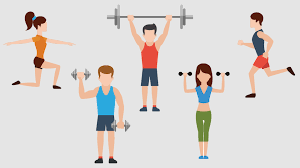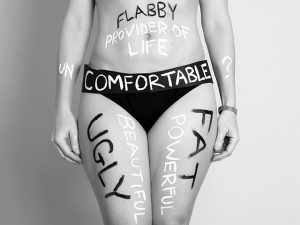Weight loss. Diets. Bootcamps and fitness. Clean eating. Intermittent fasting. Keto. Paleo. Keto Paleo Clean with intermittent fasting…  Oh my goodness, make it stop! Diets are all the buzz, have been for decades now. The sad part is they don’t work. Research has proven it, our bodies have proven it, and the industry that supports it is ecstatic because they have a guaranteed repeat business model in a multi-trillion dollar industry that is expanding. The “Wellness” industry is the diet industry. Their goal is to create and enhance dissatisfaction of our bodies so we spend an inordinate amount of time, focus, money and energy trying to change the bodies we have.
Oh my goodness, make it stop! Diets are all the buzz, have been for decades now. The sad part is they don’t work. Research has proven it, our bodies have proven it, and the industry that supports it is ecstatic because they have a guaranteed repeat business model in a multi-trillion dollar industry that is expanding. The “Wellness” industry is the diet industry. Their goal is to create and enhance dissatisfaction of our bodies so we spend an inordinate amount of time, focus, money and energy trying to change the bodies we have.
If the Wellness industry really was concerned about our health, they would promote the fact that the American Heart Association and other health agencies have started sharing research about one of the most dangerous health risks of all — yo-yo dieting. I’m not sure there is really any other kind of dieting; the proven ‘diet cause and effect’ is to lose weight in a fast manner through some form of restrictive eating and/or increased exercise (potentially over-exercise). This does give the lovely instant gratification of seeing the dial on the scale go downward or that is the hope.The reaction of the body is to swing the pendulum the other way to protect from malnutrition and starvation. The body hates famine so it self-protects by gaining the weight back over the course of 12-18 months. Since our body wants to stay alive, it will often return the weight and then provide a safety margin by increasing it’s set point by 5-10 pounds. Many people get drawn into a repeat cycle with this — restrict, return, reset, restrict, return, reset, repeat.
I’m not sure there is really any other kind of dieting; the proven ‘diet cause and effect’ is to lose weight in a fast manner through some form of restrictive eating and/or increased exercise (potentially over-exercise). This does give the lovely instant gratification of seeing the dial on the scale go downward or that is the hope.The reaction of the body is to swing the pendulum the other way to protect from malnutrition and starvation. The body hates famine so it self-protects by gaining the weight back over the course of 12-18 months. Since our body wants to stay alive, it will often return the weight and then provide a safety margin by increasing it’s set point by 5-10 pounds. Many people get drawn into a repeat cycle with this — restrict, return, reset, restrict, return, reset, repeat.
“But I have to lose weight!” Even after explaining the many concerns with dieting and over-exercise and how it is harmful to the body, clients still look at me as though I don’t seem to understand English. Many have been told by their doctors or health care practitioners that they need to lose weight. (Many of them have weight bias and fat stigma/fat phobia and are not providing appropriate non-biased medical care to their patients.) Often I ask them why that is. Often the answer is, ‘because it’s bad.’ “Do you have health issues related to your weight?” “Not yet but I will have.” Or “Yes!” As we look at their relationship with food and exercise, we often find a pattern of dieting and self-degradation/shaming. They are stuck in a shaming failure cycle of dieting, exercise spurts, juice cleanses/detox programs, weight loss surgeries, and every other weight loss product or program they can buy. None of these things are working. This often leads to mindless or emotional eating, and lack of interest in physical activity in a ‘what’s the point?’ mindset. Their weight goes down or it doesn’t. Then it comes back up further. Many come at the point where they are at their highest weight and are desperate to get the weight off. Almost all of them begrudge the day the did their first weight loss program. “If only I could be back to when I first thought I was fat!”
Often I ask them why that is. Often the answer is, ‘because it’s bad.’ “Do you have health issues related to your weight?” “Not yet but I will have.” Or “Yes!” As we look at their relationship with food and exercise, we often find a pattern of dieting and self-degradation/shaming. They are stuck in a shaming failure cycle of dieting, exercise spurts, juice cleanses/detox programs, weight loss surgeries, and every other weight loss product or program they can buy. None of these things are working. This often leads to mindless or emotional eating, and lack of interest in physical activity in a ‘what’s the point?’ mindset. Their weight goes down or it doesn’t. Then it comes back up further. Many come at the point where they are at their highest weight and are desperate to get the weight off. Almost all of them begrudge the day the did their first weight loss program. “If only I could be back to when I first thought I was fat!”
“Nice reminiscing but I still have to lose weight Beth!” Weight loss has to move to the side bar. The focus has to become  discovering a healthy relationship with food and exercise. Intuitive Eating is still the gold standard for attaining this. Getting rid of the diet mentality and restoring joy, pleasure and freedom to normal everyday eating is the goal. We need to break the compensatory link between food and exercise. Exercise, activity and movement need to be something you choose to do as part of a truly healthy lifestyle because you want maintain strength and mobility as you age. It is not to make up for eating! Food needs to be in another column altogether. We need to fuel our bodies because that is an appropriate behaviour to do — just as we naturally did as little children. That’s when we knew how to eat intuitively — to eat when we were hungry and to stop when we were full.
discovering a healthy relationship with food and exercise. Intuitive Eating is still the gold standard for attaining this. Getting rid of the diet mentality and restoring joy, pleasure and freedom to normal everyday eating is the goal. We need to break the compensatory link between food and exercise. Exercise, activity and movement need to be something you choose to do as part of a truly healthy lifestyle because you want maintain strength and mobility as you age. It is not to make up for eating! Food needs to be in another column altogether. We need to fuel our bodies because that is an appropriate behaviour to do — just as we naturally did as little children. That’s when we knew how to eat intuitively — to eat when we were hungry and to stop when we were full.
If you want to look into this further, you can check out the research by the HAES Movement — Health At Every Size. The research is vast and supports the facts that diets don’t work. Eating disorders always start with some form of diet. Let’s restore freedom and health to our relationship with food and activity — and for heaven’s sake, let’s find something else to talk about when we get together with friends and family!




